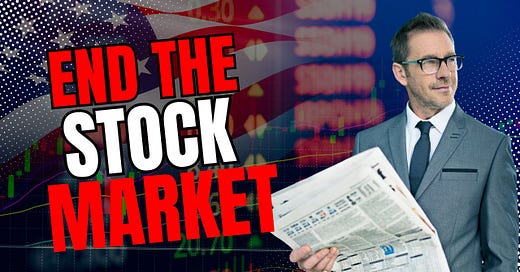The Only Way to Save the American Economy Is to End the Stock Market
If we want to decentralize wealth and power in America, the solution isn’t to tax billionaires and redistribute crumbs. It’s to cut them off at the source.
I was listening to Joe Rogan’s recent episode with Bernie Sanders—and yeah, I know, I don’t exactly line up with Bernie on much—but I’ve got to admit, the guy nailed some serious truths about the state of capitalism in America. The wage gap between CEOs and workers? It’s disgusting. Bernie said it flat out: Elon Musk owns more wealth than half the country combined. And while Bernie wants to tax the rich into submission, that’s just slapping a Band-Aid on a broken leg. It might feel good, but it won’t fix the problem.
The truth is, both the Left and the Right are right… and wrong. Liberals have diagnosed the disease: wealth consolidation, corporate greed, and the erosion of the middle class. Conservatives know the cure isn’t more government. The problem isn’t capitalism. It’s the twisted, bloated version of it we’re stuck with today... crony capitalism.
Let’s rewind a bit. America was founded on entrepreneurship. Our Founders didn’t fight the British crown so we could punch a clock for Jeff Bezos. They envisioned a society where people could support their families by honing their God-given talents, creating value, and serving their local communities. That decentralization was intentional. No kings. No oligarchs. Just free people.
For the first century of America’s existence, that model worked. Small businesses, family-owned farms, local craftsmen, and tradesmen fueled our economy. There was no stock ticker feeding Wall Street’s greed. There was no incentive to sell out your neighbor for a quick return. Wealth was earned, not manipulated.
But then came the industrial revolution, and with it, a new temptation... scale.
To grow massive industries, titans like Rockefeller, Carnegie, and J.P. Morgan realized they needed capital... and lots of it. Enter the stock market. The New York Stock Exchange, originally formed in 1792 under the Buttonwood Agreement, was relatively minor until the late 1800s. That’s when it exploded into a tool for industrialists to gather funding from the public while consolidating control at the top.
It sounded like opportunity. In practice, it began the centralization of wealth and power.
People were no longer investing in their own communities. They were sending money to far-off factories and railroads they’d never see. That money built empires... but not for them. And slowly, the American economy stopped being about personal value creation and started being about corporate shareholder value.
The Great Depression in 1929 was the first major warning shot. Wall Street’s gambling nearly destroyed the entire global economy. But did we dismantle the machine? No. We let government step in and protect it. FDR’s New Deal entangled it even deeper with government. And that relationship has only grown more incestuous.
Fast forward to today, and we’re watching the inevitable result of over a century of this corruption. Mega-corporations with more money than most nations. CEOs who make more in a day than their workers make in a year. A “market” that’s fueled by Fed policy, government bailouts, and algorithmic trading... not productivity or innovation.
The stock market is not a symbol of American prosperity. It’s a symbol of centralized, globalist control. It’s where power concentrates. It’s where wealth accumulates. It’s how politicians and corporations trade favors under the guise of “investment.”
It’s one of the greatest tools for elite control in modern history.
Millions of Americans are told it’s their path to wealth. But the average investor barely breaks even against inflation. Meanwhile, corporate insiders, hedge funds, and congressional traders rake in millions off information and systems the average American will never access.
So here’s the uncomfortable truth: if we’re going to fix the economic disaster we’re in, we need to eliminate the stock market altogether.
Not reform it. Not regulate it better. Eliminate it.
The only way to rebuild a truly free-market economy is by decentralizing it... ripping the power away from Wall Street and giving it back to Main Street. Bring business back to the community level, where value is exchanged between real people, not siphoned off by global conglomerates hiding behind a ticker symbol.
That’s one reason why I started Pickax.
Pickax isn’t just about free speech, it’s about economic decentralization. We’re working directly with creators, helping them monetize their content without relying on Big Tech platforms that hate their values. Creators are the new small businesses. They are the front line in the fight against centralization.
And we’re not stopping there. As we grow, we’re going to roll out tools for actual small businesses such as e-commerce platforms, subscription integrations, decentralized ad systems, all built to help them compete without selling their soul to Amazon or bowing to Wall Street.
These are the types of economic solutions we need. Not more government. Not more regulation. More freedom. More ownership. More personal responsibility.
If we want to decentralize wealth and power in America, the solution isn’t to tax billionaires and redistribute crumbs. It’s to cut them off at the source. Shut down the stock market racket. Starve the beast. And start reinvesting in local, entrepreneurial, self-sustaining communities.
We had that once. We can build it again.
The truth is, the stock market was never built for you—it was built to control you. If you want real independence, you’ve got to stop playing their rigged game and start investing in assets they can’t manipulate. That’s why I promote My Gold Guy—get your FREE Gold and Silver Investing Guide and start protecting your wealth the right way.






Agree…it’s original purpose “to generate capital by finding investors IPO’s. It’s the secondary market where the swooshing sound of feckless Main Street investors get fleeced by insider trading and its other variants and market manipulations. For example Pelosi taking a position then passing legislation that will increase the value of her holdings.